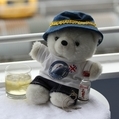Why Your Waiter is a Thief
The shortage of necessary materials in a cruise ship dining room is a serious issue, but not for the reason one might think. Each waiter is assigned a specific amount of silverware and a single rack to hold it. Fanatically guarding your silver is a matter of course on Carnival ships, and every rack is profoundly labeled. Because names are extremely confusing on ships (what, with 60 nationalities aboard), many draw pictures instead. As the only American waiter in the fleet, I drew the Stars & Stripes, which may or may not have been more intimidating than my colleague who covered his rack with superbly drawn, realistically creepy bats.
Anyone caught ‘borrowing’ from a waiter’s soiled rack during mealtime faced a severe reprimand. Anyone caught pinching clean silver risked decapitation. At the end of the first seating, waiters would rush their silver to the dishwasher and refuse to leave until the precious cargo was fully cleaned and accounted for. Those who simply hadn’t the time for such protection were forced to rely on the goodwill of the dishwashers to keep prying hands away. Needless to say, dishwashers enjoyed a healthy gratuity for ensuring this “goodwill”. We waiters did not begrudge them, as our less-than minimum wage was generous compared to a dishwasher’s salary.
At first, I was disgusted with Carnival’s apparent inability to supply their employees with necessary equipment. Every station was required to have X number of saucers, water glasses, wine glasses, silverware, side plates, coffee cups, etc. Yet there was simply never enough of any of these items. Absurdly, a nightly inventory was required and all items were displayed openly upon the tables for counting. Specialty items in particularly high demand, like butter dishes (because guests stole them, too), were exposed for all to pinch (steal). So after all that hard work serving guests, waiters endured unpaid guard duty over their stations and waited for the appropriate manager to OK their station. After being cleared and departing, thieving packs of waiters descended upon these stations to gather what they needed for their own inspection. For, to pass the inventory, a waiter was required to steal from another that had already been designated as fully stocked. A nasty consequence of this was that waiters arrived at their stations an hour early—off the clock—to steal it back. Or as much as they could, anyway. The whole thing was bizarre, and completely inimical to the cruise line’s insatiable and unrealistic demands for superior service.
Only after observing the restaurant staff did I begin to understand Carnival’s policy. The attitude of most waiters was one of extreme indifference towards property. Breakage was exceptionally high because no one cared about the cost. Carnival was a billion-dollar sweat-shop, so why should an over-worked, under-paid waiter care if he dropped a cup? But twenty broken cups a night on each of twenty ships added up in a hurry! By demanding that each station be equipped completely and enforcing it nightly, Carnival threw the responsibility right back onto the waiters. Breakage was thusly low. Frustration thusly high.
Any waiter wanting to get tipped by all his guests—his only salary for the whole cruise—had to focus on preventing breakage. How else can you make happy twenty-six guests simultaneously demanding coffee when you only have ten cups and eight saucers? Pinching on the go was mandatory. Yet even legitimate accidents did not guarantee replacement of necessary equipment. The system was brutal but effective; a metaphor for all things at sea.
For more back of the house surprises, my book Cruise Confidential is full of them. I ran the gamut of the restaurants, from busboy up to management (and back down to waiter!).
Brian David Bruns













1 Comment
Recommended Comments